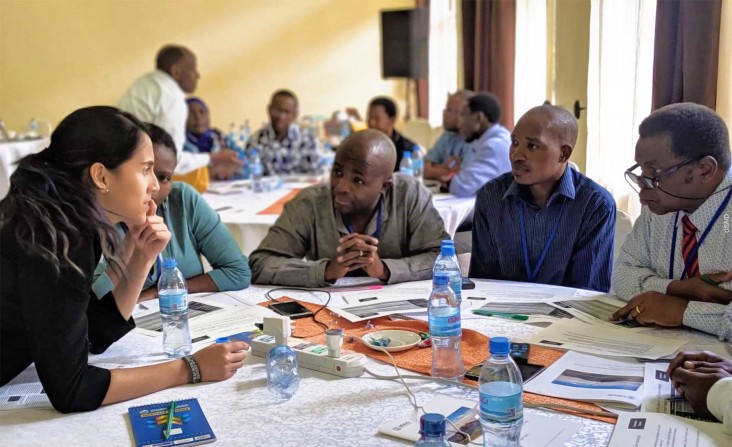Speeches Shim

Tanzania examines factors influencing auction prices worldwide, auction design, and bankable power purchase agreements, as well as how to use government support when addressing barriers to financing renewable energy investments.
USAID supports partner countries on their journey to self-reliance by helping design and implement auctions that can rapidly scale clean energy at low prices and advance national economic and clean energy goals. USAID provides support for auctions through bilateral and regional energy programs and a variety of programs managed out of Washington, D.C.
In 2018, Tanzania Electric Supply Company (TANESCO) issued a prequalification for 350 MW of new utility-scale wind and solar plants. Following the announcement, the Ministry of Energy requested that USAID help increase the capacity of agencies involved in the eventual auction. If the auction moves forward, the new plants will be the first large-scale renewable energy independent power producers in the country and will create robust opportunities for foreign investment. The auction will also assist Tanzania in achieving the country’s planned renewable energy target of 5 percent by 2025 for all domestic grid-connected power generation.
In February, July, and October 2019, USAID hosted several workshops that included the following competitive procurement objectives:
- Discuss global best practices in competitive procurement and select country case studies;
- Focus on major competitive procurement design elements and principles of key contractual documents;
- Convene robust discussions across different energy stakeholders in Tanzania and learn from international experience in the energy sector; and
- Use knowledge through designing major auction elements for a fictitious country case study.
Participants in the various workshops included the Tanzania Ministry of Energy, TANESCO, Energy and Water Utilities Regulatory Authority, Tanzania Ministry of Finance and Planning, the Attorney General’s Office, the Public Procurement Regulatory Authority, the Treasury Registrar, and members of the Parliament’s Energy Committee.
USAID, financial, legal and auction experts presented on key competitive procurement topics, including auction design, locational signals, creating a bankable power purchase agreement, bringing projects to financial close, providing government support, and the auction experiences of specific countries. Representatives from the African Development Foundation and World Bank Multilateral Investment Guarantee Agency also presented on the financial services and tools offered at the workshops.
In February 2020, 10 prequalified companies submitted formal auction bids. Once completed, the auction will be a major step toward diversifying Tanzania's electricity mix and allowing private sector investment into the energy sector.
Those who implement and oversee renewable energy competitive procurement processes can gain new skills from these workshop presentations, which are available below.
Recent Developments in the Tanzanian Energy Sector and Competitive Procurement Design Elements Introduction
Definition and Advantages of Renewable Energy Competitive Procurement (PPTX 1MB)
Navigant defined competitive procurement and examined its advantages compared to negotiated procurement and administrative feed-in tariffs.
Policy Objectives and Market Readiness (PPTX 2MB)
Navigant presented on the importance of tailoring auction design to a country's policy goals, energy market, and institutional readiness.
Design Elements and Country Experiences—Part I (PPTX 2MB)
Navigant presented design elements regarding project site selection and prequalification requirements, as well as lessons learned from international experience. A bidding simulation illustrated the problem of “the winner's curse” and its implications for auction design.
Competitive Procurement Design Elements and Global Case Studies
Design Elements and Country Experiences—Part II (PPTX 2MB)
Navigant provided an overview of design options and country experiences related to defining ceiling prices, financial guarantees, and penalties for non-compliance with contractual obligations.
Getting Project Location Right (PPTX 2MB)
Navigant explored location-based incentives to steer the location of projects away from areas that are resource rich but costly to connect. Examples such as a bonus/penalty for bids located in areas with available/insufficient grid capacities; capacity quotas at the regional or substation level; and site-specific auctions.
Principles of Bankable Contracts (PPTX 811K)
Norton Rose Fulbright explored key bankability, renewable energy technology, and implementation clauses in power purchase agreements.
Best Practices for Communication (PPTX 10MB)
Fieldstone discussed best practices for governments to use when communicating with the private sector during competitive procurements.
Bringing Projects to a Financial Close in Africa (PPTX 10MB)
Fieldstone discussed key recommendations in the auction process that will maximize the prospect of financial close in Africa, where it is estimated that only around one in three projects progress from the significant development phase to financial close.
Bringing It All Together (PPTX 1MB)
Navigant discussed how tender documents, including power purchase agreements, set the implementation framework for auction programs and how balanced risk allocation between the buyers and sellers of power is key in achieving competitive auction prices and high project realization rates.
Developing Competitive Procurement Tools
Different Competitive Procurement Models from around Africa (PPTX 1MB)
Navigant analyzed the design and implementation of renewable energy auctions in Zambia, Senegal, and Morocco and how the risk allocation between buyers and sellers of power helped to channel private investment.
Government Support Options (PPT 329K)
Norton Rose Fulbright examined different ways that governments support agreements in Nigeria, Malawi, and Kenya: sovereign guarantees, implementation agreements, letters of support and letters of comfort, put and call option agreements, and concession agreements.


Comment
Make a general inquiry or suggest an improvement.